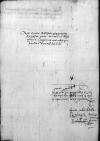Letter #695
Ferdinand I of Habsburg to Ioannes DANTISCUSSpeyer, 1531-10-09
Manuscript sources:
Auxiliary sources:
Prints:
| ||||||||||||||||||||||||||
Text & apparatus & commentary Plain text Text & commentary Text & apparatus
Reverendo devoto sincere nobis dilecto domino
Reverende devote sincere dilecte.
Redditae sunt nobis litterae vestrae una cum adiunctis serenissimimi principis domini
Datum in nostra imperiali civitate
Ioannes Maius scripsit

